BLOGS BY:
Defrazzle Me
Exhausted and then some...

Understanding Burnout and Emotional Eating: A Vicious Cycle
Introduction:
Burnout, stress and fatigue often lead to many maladaptive coping mechanisms such as smoking, drinking, tv binging and eating crappy food. I am the first to consume a TimTam or 17 when the going gets tough. They all run off they same dopamine cycle – it is the instant gratification. That is when consuming food high in sugar, salt or fat this triggers the pleasure centres in the brain providing immediate feelings of comfort alleviating the negative emotions. To add to this cortisol (the stress hormone) increases the appetite for high calorie food.

The Cycle of Burnout
Burnout arises from prolonged exposure to stress, whether from work, personal life challenges, or a combination of both. It often manifests as physical fatigue, emotional exhaustion, and reduced productivity. Over time, individuals experiencing burnout often are caught in a cycle where they push harder to meet demands, neglect self-care and ultimately deplete their mental and physical reserves. No wonder so many of us reach breaking point – the juggle, beautiful ladies, is real.
Emotional Eating as a Coping Mechanism
Emotional eating often accompanies burnout as individuals seek relief from stress, anxiety, or even boredom through food. This behaviour is driven by the temporary pleasure and distraction food provides, offering a quick escape from negative feelings. Common triggers include deadlines, conflicts, financial worries, or even loneliness, which prompt individuals to reach for unhealthy snacks or overeat, further exacerbating their emotional state.
The Link Between Burnout and Emotional Eating
The relationship between burnout and emotional eating forms a detrimental cycle. Burnout increases the likelihood of emotional eating as stressed individuals seek comfort in food. Indulging in high sugar and fat foods is a form of self-soothing or emotional regulation distracting us from the feeling of dis – ease. It often numbs us completely from the emotional distress and over time can become habitual like any other addictive substance.
It is not helpful that most of these products are marketed excessively. You don’t see lettuce at the checkout or petrol station cashier. Tomatoes and celery never fill a bus stop or billboard advertising. Products like chips, chocolate bars, ice-creams and soft drinks readily available and easy to grab in times of stress or time-poor times (is that even correct English??).
This can in turn can lead to guilt, shame, weight gain and worsened emotional well-being. This cycle perpetuates itself as poor dietary choices which often contributes to physical fatigue and emotional instability, exacerbating burnout symptoms.
Breaking the Cycle
Breaking free from the cycle of burnout and emotional eating requires a multi-faceted approach:
Recognizing Triggers: Identifying stressors and emotional triggers that lead to overeating is crucial. Developing awareness helps individuals anticipate and manage these triggers effectively.
Stress Management: Implementing stress-reduction techniques such as mindfulness, meditation, exercise, or hobbies can alleviate tension and reduce the urge to use food as a coping mechanism.
Healthy Coping Strategies: Encouraging healthier coping mechanisms like talking to a friend, journaling, breathwork, self-awareness, meditation or professional help all which can provide more sustainable relief than relying on food.
Nutritional Awareness: Paying attention to nutritional needs and making balanced food choices can stabilize mood, boost energy levels, and support overall well-being. Try snacking on more protein – cottage cheese, peanut butter on celery, chicken salads, avocado, eggs or protein balls.
Self-Care: Prioritizing self-care through adequate sleep, regular physical activity, and setting boundaries to manage workload and personal commitments is essential in preventing burnout and reducing emotional eating tendencies.
Addressing burnout and emotional eating requires a holistic approach that prioritizes self-awareness, stress management, and healthy coping strategies. By recognizing the interplay between these two issues and taking proactive steps towards self-care and emotional resilience, individuals can break free from the harmful cycle and foster a healthier relationship with food and stress. Through mindfulness and balanced living, one can cultivate habits that promote long-term well-being and resilience in the face of life’s challenges.
Take the first step towards recovery
and book a free consultation with
Defrazzle Me today.
Let's Connect




